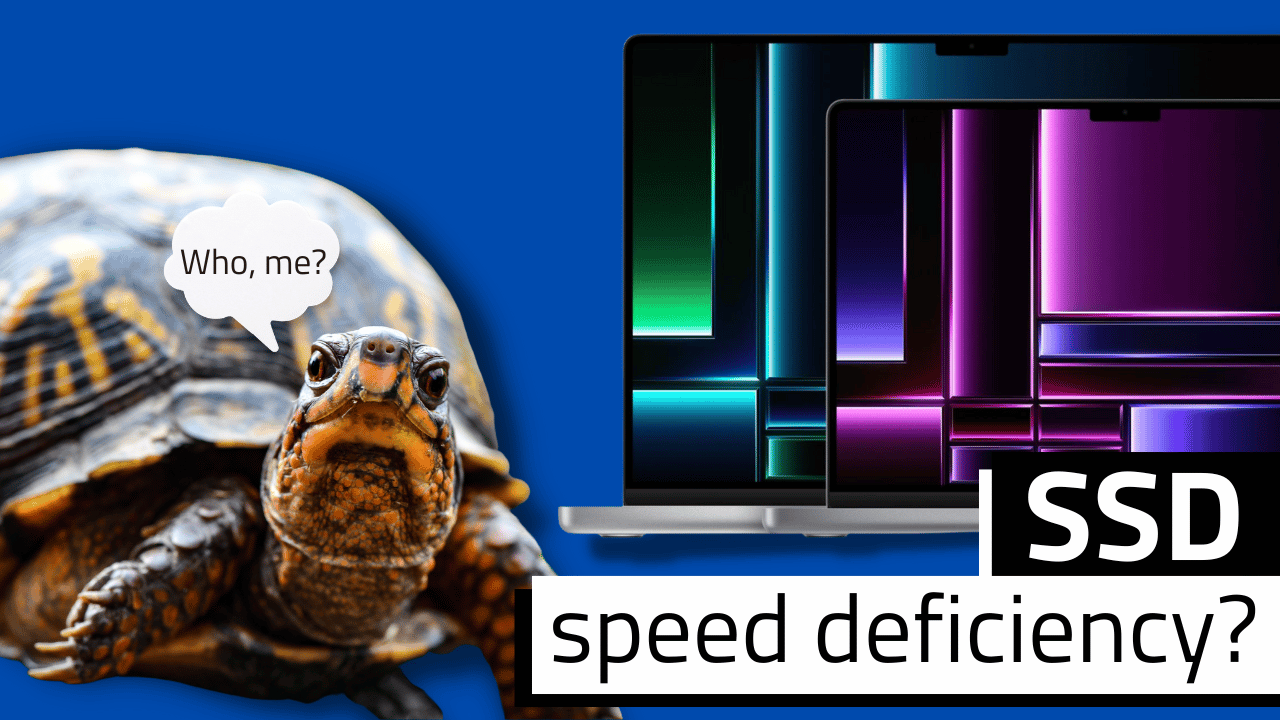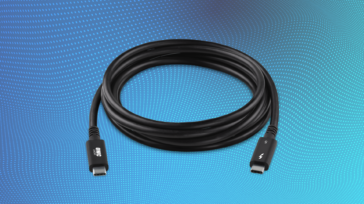
Our friends over at 9to5Mac this morning made a bit of a startling discovery: SSD performance on the new M2 Pro MacBook Pro has dropped considerably from the previous generation.
Specifically, 9to5Mac reporter Derek Wise found that write speeds on the 2023 M2 Pro MacBook Pro with 512GB of storage fell 20% to 3154.5 MB/s when compared to the M1 Pro MacBook Pro with the same amount of storage. Read speeds saw an even more dramatic drop, falling a whopping 40% from the M1 Pro model to 2973.4 MB/s on the M2 Pro machine.
The reason for the drop in performance is due to a change Apple made to its SSD configuration in the base model 2023 MacBook Pro. While the M1 Pro model split 512GB of storage between four NAND chips, Wise opened up the new model and found that it apparently uses two 256GB NAND chips. Having more NAND chips running in parallel—as the M1 Pro MacBook Pro did with four 128GB NAND chips—results in faster read and write speeds and this new MacBook Pro configuration is a glaring example of that.
That being said, this change in performance will likely not be felt in everyday use by the majority of users, especially those opting for only 512GB of storage on a Pro machine. For instance, here’s a bit of perspective: Even with only 3,154.5 MB/s of write performance, these new MacBook Pros would be able to write over the entire 512GB SSD in around 3 minutes. So it’s still pretty fast.
However, you also don’t expect to see key performance specs like SSD read/write drop on new supposedly more capable products, so the sting remains. Especially when you’re spending a minimum of $2,000.
Some additional perspective: as Derek alludes to in his 9to5Mac article, we’re not sure what real-world application this would impact where you’d have only a 512GB drive to work with. Looking at this holistically and how the SSD is utilized in real world applications, it’s like finding out the updated version of the car you’ve been looking at now only goes 150MPH when the old one could hit 180…. except that even in extreme passing or on the Texas Tollroads, you never go over 100… oh, and now the car is 20% faster getting 0 to 100.
Also, because the 1TB and 2TB configurations will spread their storage across more than two NAND chips, those models are likely spared from the precipitous drop in read/write performance. So if you absolutely want to avoid the prospect of any performance drop when upgrading your machine to this 2023 model, it’s something to keep in mind.
But if you’ve already ordered a base model, or can’t justify anything above 512GB of internal storage, there is one more thing to consider when it comes to read/write speeds. If your primary concern is data ingest, anything beyond 2,800 MB/s is faster than any external ingest source can provide via Thunderbolt anyway. For instance, here at OWC we’ve been able to hit sustained 4,000 MB/s performance, but to achieve it we had to use two of the MacBook Pro’s Thunderbolt ports with two of our ThunderBay RAID enclosures RAIDed externally.
What do you think of this performance drop? As Derek points out in the linked 9to5Mac piece, this performance drop also occurred on the M2 MacBook Air due to the same NAND consolidation practice. Do these changes matter in the long run? Are they an example of a growing problem with Apple products charging premiums on non-upgradable components soldered to the motherboard? Or are they simply the reality of building a product lineup trying to meet Good, Better, and Best performance and pricing tiers?
And if you have the 512GB configuration of the 2023 MacBook Pro, where do you feel the crunch from this difference in SSD speed the most? Let us know in the comments.













Apple puts data integrity first.
Larry Jordan did test on SSD’s under Monterey and Ventura. Ventura was about 30% slower.
https://larryjordan.com/articles/warning-exfat-does-not-exist-in-macos-ventura-and-ssd-speeds-are-
Striping data across multiple memory chips is a RAID 0 configuration that increases read and write speed but every chip has a limited lifespan and each chip adds another point of failure to the SSD so if any one of the chips in a RAID 0 configured SSD were to fail, then the entire stripe set will fail … So the entry level SSD is probably more reliable, but slower…